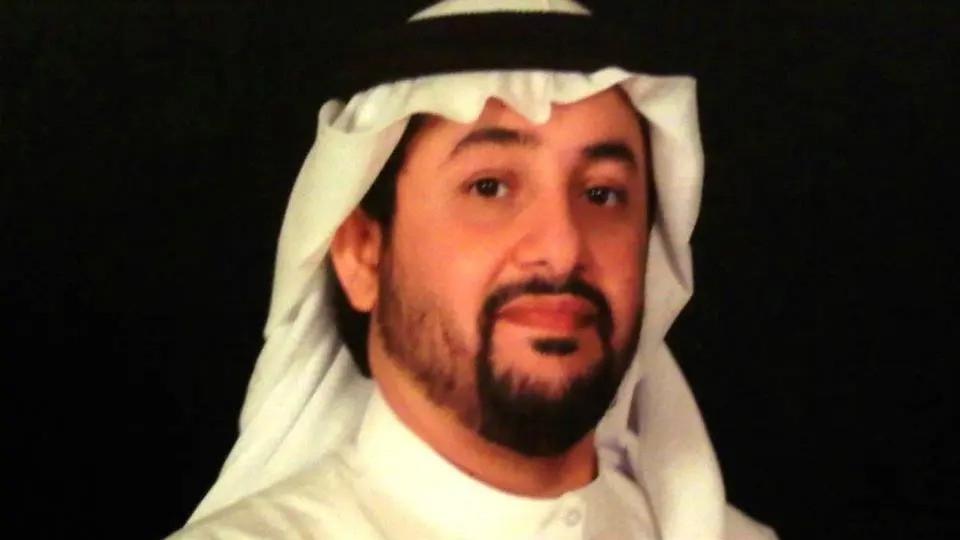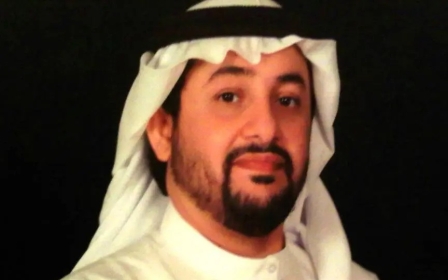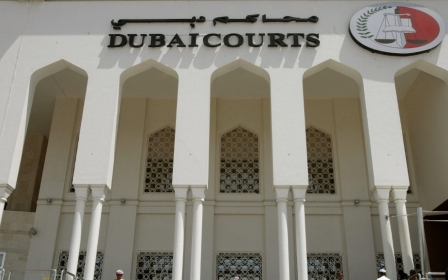Jordan's presumed extradition of UAE businessman 'violates constitution'

A Jordanian MP and former judge say they believe authorities broke the law with the presumed extradition to the UAE of an Emirati-Turkish dual citizen after his arrest in Amman this month.
Khalaf al-Romathi, 58, was convicted by an Emirati court in 2013 in a mass trial of 94 critics of the Emirati government - dubbed the "UAE94" - which human rights groups have widely criticised as grossly unfair.
Romaithi has been living in self-imposed exile in Turkey for more than a decade. He was understood to be visiting Amman to look at schools for his son when he was arrested on 8 May on a warrant issued at the UAE’s request.
The businessman was scheduled to appear in court for an extradition hearing on 16 May, but his family and lawyer have said they lost contact with him on 9 May.
Neither Turkey, Jordan, or the UAE have officially commented on Romaithi’s whereabouts.
New MEE newsletter: Jerusalem Dispatch
Sign up to get the latest insights and analysis on Israel-Palestine, alongside Turkey Unpacked and other MEE newsletters
On 17 May, the state-run Emirates News Agency reported that he had been “received”. In the absence of further public information, many following the case believe this to be true.
If, in fact, he has been sent to the UAE, human rights advocates have warned that Romaithi would be at risk of enforced disappearance, arbitrary detention, and torture, a fact which worries Jordanian MP Adnan Mashuqa.
"What the Jordanian government did in the Al-Romathi case is a grave mistake,” he told Middle East Eye.
“It is not permissible to extradite a citizen who might lose his life or be subjected to torture in another country. There should have been a judicial decision.”
On Tuesday, Mashuqa submitted four questions to the Prime Minister’s Office seeking answers about what happened and whether it was legal.
Retired Jordanian judge and lawyer Luay Obeidat told MEE that he believes Jordanian authorities violated the kingdom’s constitution and international human rights treaties to which it is a signatory.
"Jordan is obligated to protect political dissidents under international agreements it has ratified, such as the International Covenant on Civil and Political Rights, which stipulates the protection that political dissidents should enjoy,” Obeidat said.
Further, he said, Article 21 of the Jordanian constitution calls on the state to refrain from extraditing political refugees because of their political rights and the expression of their freedoms.
Murky information
Details surrounding what happened to Romaithi after his arrest and his current whereabouts have been difficult to verify in the absence of official government statements and many questions remain.
Last week, Hamad al-Shamsi, executive director of the London-based Emirates Detainees Advocacy Center (EDAC), told MEE that a credible source told his organisation that Romaithi had been extradited to the UAE on 12 May.
Shamsi said the source said Romaithi was deported to the UAE as a result of an administrative decree made by the governor of Amman and under the auspices of the Ministry of the Interior.
This came, Shamsi said, despite a document that EDAC has obtained that appears to show a Jordanian court ordering Romaithi's release on 10 May.
The Amman governor Yasser al-Adwan declined to comment when MEE asked if he was responsible for the extradition.
Article 37 of the 1999 Legal Cooperation agreement between Jordan and the UAE states that “those wanted for political issues will not be handed over”. But Article 40 of the same agreement says that “terrorism crimes are not considered political”.
The accusation of terrorism has been used fluidly by many of the region’s leaders and governments to imprison political opponents. Emirates news agency WAM said Romaithi was guilty of “terrorism” in a 17 May article, and that he was sentenced in 2013 to 15 years on charges of creating a secret organisation that belongs to the “terrorist” Muslim Brotherhood group.
However, his supporters and rights advocates, say his conviction, like those of the other UAE94, were based on his peaceful exercise of the right to free expression, association, and assembly.
Obeidat, the former judge, said an administrative governor in Jordan could not exercise its powers of extradition so long as the case was pending before a court that could find the conditions for extradition had not been met.
"As long as the case was under the jurisdiction of the Jordanian judiciary, the governor cannot take over the role of the judiciary and violate its role by deporting this person before a final verdict is issued by the courts,” he said.
“What Jordan has done is a clear violation of the constitution and human rights conventions."
Not the first time
This would not be the first time that Jordan has extradited citizens to other countries in circumvention of judicial processes, legal experts told MEE.
In 1995, Jordan handed over Eyad Najm to US authorities. The Jordanian citizen was accused of being involved in the 1993 World Trade Center that killed six people, but some MPs called the move unconstitutional.
Once in US custody, Najm was sentenced to 240 years in prison on charges of terrorism, including 18 years in solitary confinement.
But Jordan has also refused to extradite citizens, including Ahlam al-Tamimi.
Tamimi was convicted by an Israeli court for her involvement in the bombing of a restaurant in Jerusalem in September 2001 which killed 15 people, including some who held US citizenship.
The Jordanian citizen was sentenced to life imprisonment and served 10 years before she was released into Jordanian custody as part of a prisoner exchange with Hamas in 2011.
Jordan has since refused to hand her over to Washington.
But Assem Al-Omari, the Jordanian lawyer assigned to defend Romaithi told MEE that he believes the situation for his client is particularly unique and that what happened is “an unexpected surprise”.
“The judge was about to investigate the extradition orders and whether all conditions have been met according to the agreement of exchanging prisoners between the UAE and Jordan,” Omari said.
“Romaithi came to Jordan and trusted them. He wanted to enroll his son in Jordanian schools, after the advice of a friend. He trusted Jordanian education, so he came to Amman.”
Mashuqa, the MP who has posed questions to the PM's office, said he also wants to understand why the government has not sought the release of Jordanians held in Emirati prisons if there is an agreement between the UAE and Jordan to extradite wanted and convicted people.
In October 2015, Emirati authorities arrested Jordanian brothers Yasser and Abdullah Abu Bakr on charges of sharing a video clip of the Islamic State on WhatsApp.
Their mother, Manal Muhailan, told MEE that they shared the clip between them and their two friends, Bahaa Adel Matar and Maher Attia Abu Al-Shawareb, "with the intention of sharing news, not promoting it".
All four were sentenced to ten years in Emirati prison and a one million dirham ($272,294) fine each.
Five other Jordanians were arrested by UAE state security after circulating a video criticising Saudi Arabia's role in the Yemen war.
In 2018, they were sentenced to ten years in prison and a fine of one million dirhams ($300,000).
The prime minister's office is legally obliged to answer Mashuqa's questions within 14 days but also has the right to request a delay of an additional 14 days.
Middle East Eye delivers independent and unrivalled coverage and analysis of the Middle East, North Africa and beyond. To learn more about republishing this content and the associated fees, please fill out this form. More about MEE can be found here.





